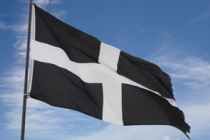Cornwall - Kernow
Cornwall (Kernow) is at the tip of the south-west of Britain. It's north and western area is bordered by the Atlantic. To the south by the English Channel and east by the county of Devon. Cornwall covers an area of 1,376 square miles and the administrative centre is Truro. The area is noted for its moorland landscapes, large and varied coastline, with many place names derived from the Cornish language. The Isles of Scilly, part of the ceremonial county of Cornwall, are about 28 miles from the Cornish coast in the Celtic sea.
Cornwall's Celtic identity
Cornwall is recognised as one of the Celtic nations and it retains a distinct cultural identity and a nationalist movement exists which campaigns for greater autnomy which recognises the Cornish people's national identity.
Cornish history
The history of Cornwall begins with the pre-Roman inhabitants, who spoke a Celtic language that would develop into Brythonic Cornish. The Cornish language is one of the Celtic languages, closer to Breton and Welsh than to Irish, Manx and Scottish. Cornwall was part of the territory of the tribe of the Dumnonii. Through the Roman period it appears that Roman rule was not effective in this area.
Cornwall's relationship with England and the United Kingdom
At no time has any Act of Union or Joinder taken place between Cornwall and the Kingdom of England or its successor states. The Duchy of Charters of 1337 formalised and defined the relationship between the separate Sovereign territory of Cornwall and the Kingdom of England and these remain valid today.
Cornwall's economy
Mining has been important to the Cornish economy historically. Becoming significant during the Middle Ages it expanded in the 19th century when copper mines were also in production. The tin and copper mines entered a period of decline In the mid-nineteenth century. Later china clay extraction became important. Traditionally fishing and agriculture were important sectors of the economy. The development of tourism during the twentieth century has now made this a vital part of the economy.





